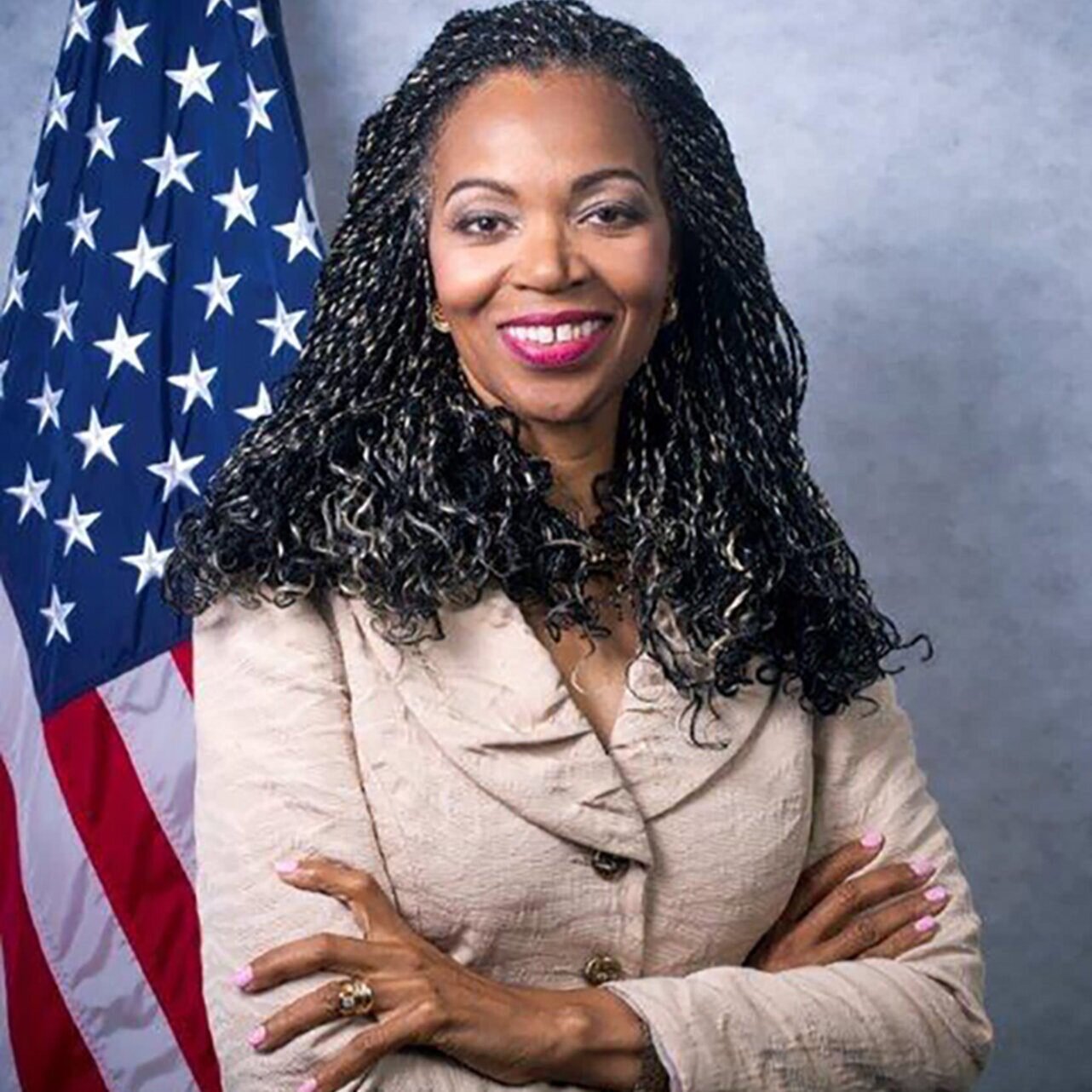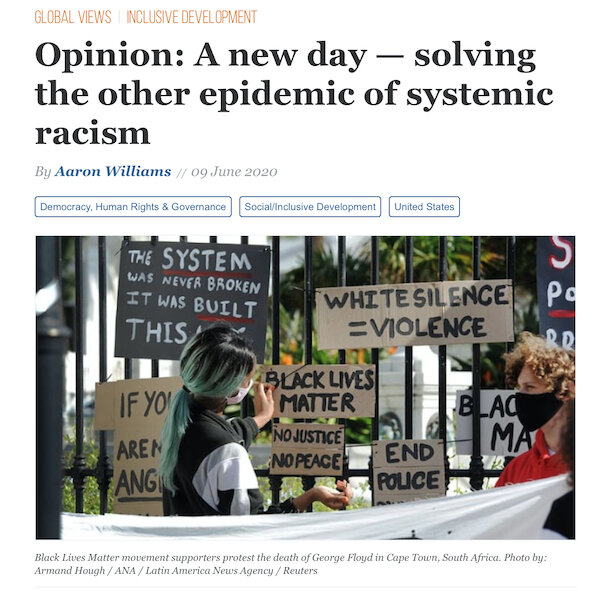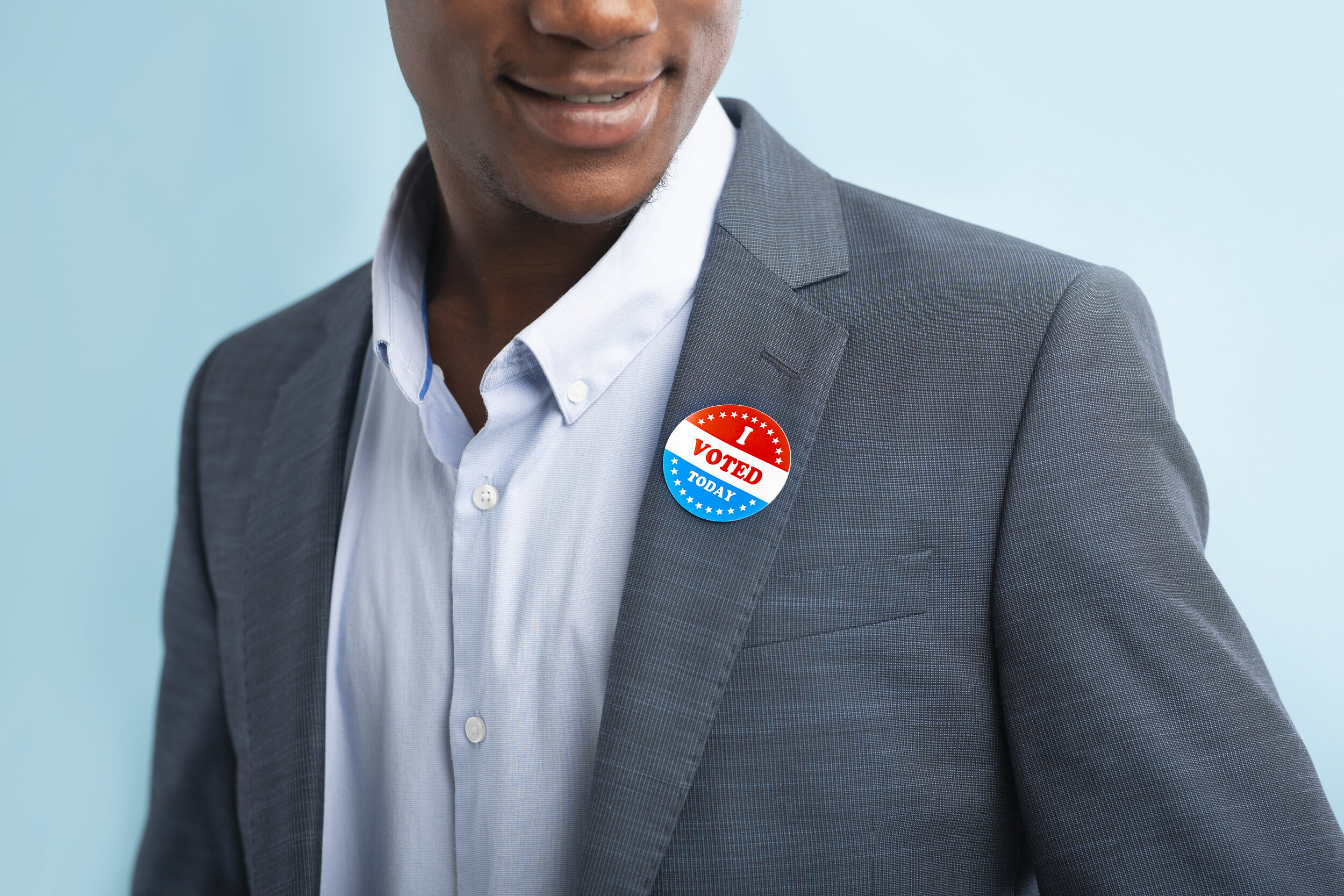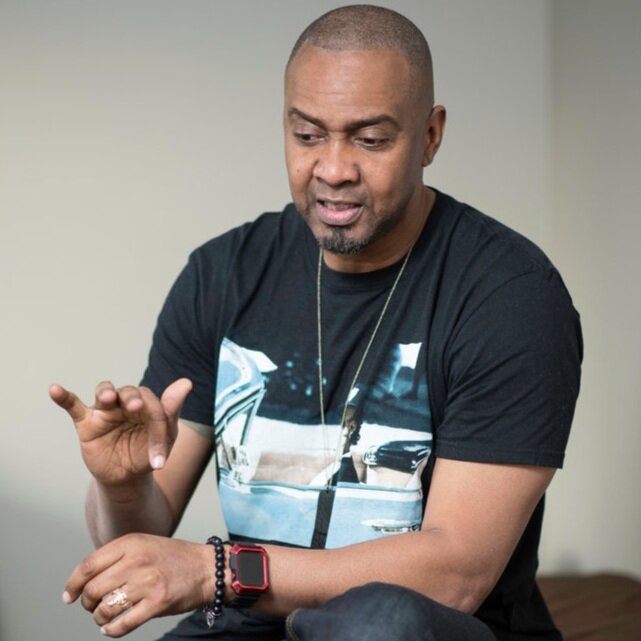
We stand against racial injustice and affirm our commitment to empathy, compassion, and justice — here at home and around the world.
By Maricarmen Smith-Martinez and Glenn Blumhorst
As Returned Peace Corps Volunteers (RPCVs), current and former staff, host country nationals, family, and friends, we uphold a commitment to creating a better world, one that promotes world peace and friendship. In this spirit, National Peace Corps Association envisions a united and vibrant Peace Corps community. Yet in the midst of national unrest ignited by systemic racial injustice, a vision of unity and vibrance is not enough. We must take more concrete steps to ensure a diverse, equitable, and inclusive culture for all RPCVs and members of our community.
Evidence of racial inequity exists in many forms, and the COVID-19 pandemic has further exposed deep systemic problems in our country. Continued violence and police brutality against the Black community has ignited protests from coast to coast — and in scores of other countries. Economic insecurity, impacting tens of millions of Americans, disproportionately impacts people of color. Black Americans are dying at higher rates due to health disparities rooted in a problematic healthcare system. And while the ongoing struggle for racial equity and social justice resonates strongly with core Peace Corps values, Volunteers of color continue to share challenges of racism, bias, and exclusivity, describing experiences during recruitment, in service, and after returning home.
In a time of global pandemic, we’re faced once more with a brutal truth articulated years ago by Sargent Shriver, who founded the Peace Corps: “We must also treat the disease of racism itself.”
It is humbling to acknowledge shortcomings, and it is difficult to change a system — but we will not succeed if we do not try. Inherent in this effort is the need for change within NPCA itself. Our staff and Board of Directors must consistently reflect the diversity we champion. Our programming must proactively incorporate values of diversity, equity, and inclusion.
Join Us in this Work
We understand that RPCVs are ready to support this cause. We recognize the difficulty of sharing experiences with racism and bias — from decades past or just last week. And we applaud those who are able to speak out and voice their experiences. We also acknowledge the discomfort of approaching conversations about race from a point of privilege. We commend the RPCVs and affiliate groups that have facilitated events to not only advance the conversation but also take action.
We are listening, and we stand in solidarity with all who are actively driving efforts for change. On behalf of the NPCA Board and leadership, we seek your feedback, encourage your recommendations, and invite your ideas. And we welcome your shared commitment to this crucial work now — and for the long haul.
What are Affiliate Groups doing to combat racial inequality?
Affiliate Groups are mobilizing to respond to the urgency of racial justice in America. Many of them are organizing events, providing resources, or using their platform to call for change.

A Community Report on How to Reimagine, Reshape, and Retool the Peace Corps for a Changed World
IN SPRING 2020, due to the COVID-19 pandemic, the Peace Corps evacuated all Volunteers from service around the globe. For the first time in the nearly 60-year history of the agency, no Peace Corps Volunteers are currently serving overseas. This abrupt interruption of Peace Corps service has dramatically altered the lives of the Volunteers, and it has profoundly disrupted the work and relationships in communities where they were serving. The global evacuation of Volunteers also brought to the fore some longstanding challenges for the agency and the broader Peace Corps community.
Harnessing the experience, commitment, and innovative ideas of the Peace Corps community, National Peace Corps Association (NPCA) convened a series of national community discussions and a global ideas summit to ask some far-reaching questions about the future of Peace Corps in a changed world. The actionable recommendations that emerged are captured in the report Peace Corps Connect to the Future.
During the community conversations it was made clear that three primary themes cut across the entirety of the issues discussed in the report:
1. The Peace Corps community must be a leader in addressing systemic racism.
The Peace Corps agency, like American society as a whole, is grappling with how to evolve so that its work fulfills the promise of our ideals. This means tackling agency hiring and recruitment, and greater support for Volunteers who are people of color, to ensure an equitable Peace Corps experience. It also means ensuring that perceptions of a “white savior complex” and neocolonialism are not reinforced. These are criticisms leveled at much work in international development, where not all actors are bound by the kinds of ideals that are meant to guide the Peace Corps. Conversely, many in the U.S. bristle when hearing these terms; but it’s important to both recognize the context and address them head-on to enable a more effective and welcome return for Volunteers. NPCA and its affiliate groups must also demonstrate leadership in this space.
2. The Peace Corps agency needs to stand by its community — and leverage it for impact.
Community-driven programming will keep the work both current and relevant to the world around us, ensuring that the agency succeeds in its mission in a changed world.
3. Now is the moment for the Peace Corps agency to make dramatic change.
The opportunity for a reimagined and re-booted Peace Corps now exists and it should be taken. This report shows the way.
Read the full report here, starting with Chapter 1: FOSTERING RACIAL DIVERSITY, EQUITY, AND INCLUSION IN THE PEACE CORPS
We are the messengers of what Peace Corps is and can be
Returned Peace Corps Volunteers continue to bring a sense of community and commitment to the critical work they’re doing domestically — at a time of a global pandemic, raising their voices against racial injustice.
Meet the 2020 Winners of the Franklin H. Williams Award
The award honors six Returned Peace Corps Volunteers who have served around the world — and a leader who has worked to close the racial and wealth gaps in the Chicago area.
We are the messengers of what Peace Corps is and can be
Ambassador Gina Abercrombie-Winstanley recounts the opportunities she helped create — and the resistances she faced — as an African American woman serving in the Peace Corps and in the U.S. Foreign Service.
African Americans and the Future of the Peace Corps
Constituency for Africa convened a group of Peace Corps leaders for a timely and needed conversation — with all Peace Corps Volunteers evacuated from around the world because of COVID-19, and as our nation grapples with pandemics of coronavirus and systemic racism.
Each Generation Must Do Its Part
Darlene Grant on her task to help shape “a more just and equitable Peace Corps.”
Looking Back at the March on Washington for Jobs and Freedom: A Conversation with Betty Currie
On August 28, 1963, Martin Luther King gave the “I Have a Dream” speech that has become a defining moment in American History. Women of Peace Corps Legacy interview founding member Betty Currie about her experience there.
Black Lives Matter: Voices and Scenes from Protests with the Peace Corps Community
George Floyd. Breonna Taylor. Tony McDade. Elijah McClain. A fraction of a terrible litany of Black lives taken by police. Since Memorial Day Returned Volunteers have been on the streets to join protests—and lead them.
it’s time to tackle systemic racism
Former Peace Corps Director Aaron Williams issues a clarion call for building a more inclusive network for global development: “The diversity of the demonstrators gives me great hope that this could be the pivotal moment in our nation.”
Putting People First
Jocelyn Jackson served as a natural resources Volunteer in Mali 2005-06. She cofounded the People’s Kitchen Collective in Oakland, California to serve the community and to spark discussion, connection, and long-term change.
Food for thought and life
Ackeem Evans served as a Peace Corps Volunteer in Albania. He’s now leading operations for World Central Kitchen in Georgia, distributing more than 65,000 free meals to the needy and underserved in the metro Atlanta area.
looking for solutions in little rock
Tim Campbell served as a Peace Corps Volunteer in The Gambia. He’s working with other community activists to advocate for more community engagement from law enforcement and support at peaceful protests.
Let’s better understand each other
Garrison Davis volunteers with a variety of social activist groups and is part of a coalition calling for greater police oversight and asking legislators to establish a statewide citizen-led community review board for law enforcement in Delaware.
Liberty, Equality, Justice
Nathaniel Sawyer served as a Peace Corps Volunteer in Ecuador. He is helping lead peaceful protests in California against racial injustice. And studying at the Middlebury Institute for International Studies at Monterey.
Peace Corps Ideals at a Time of National Crisis
The killing of George Floyd marks a horrific confluence of recent social, health, and economic events that are devastatingly disproportionate to Black Americans and other communities of color. Addressing our nation’s legacy of racism aligns directly with the aspirations of Peace Corps service — promoting peace, friendship, understanding, and opportunity. We encourage you to contact your members of Congress to express yourself.

Listen. Learn. Act.
expand and protect voter participation
In an election year marked by crisis, here’s how you can help expand and protect voter participation.
Teachable Moments
This podcast features five Black Peace Corps Volunteers discussing the impact of race, physical appearance, and gender on Peace Corps service.
FREE Course on Racialized Trauma
Build community-oriented understandings so that we can move from our racialized lens to a cultural lens – and move further to a lens of healing.
Support Black-Owned RPCV Businesses
STORYSPOT
StorySpot provides an easy-to-use platform that helps you build rich, multimedia stories about anything. A person in your life. An event. A season. An impactful project. Anything.
Peace Corps’ Commitment to Addressing Racial and Social Injustice
Peace Corps Director Jody Olsen delivered the following message to the Peace Corps on June 10:
“The Peace Corps stands against racism and supports Black lives. We as an agency and a community know we still have work to do. We commit to doing that work. We thank the Peace Corps community for holding us accountable. We hear you and we will do better.”


















